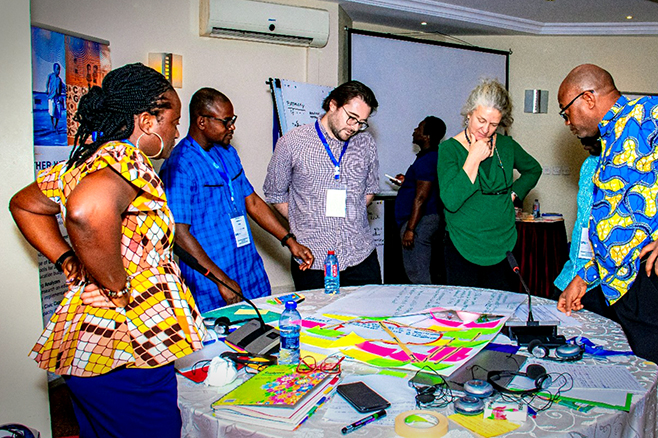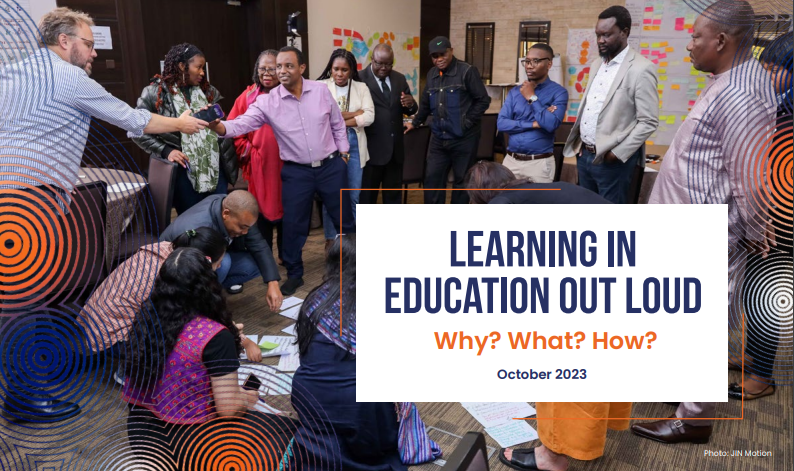Study: The impact of learning supported by Education Out Loud in West and Central Africa
After four years of supporting continuous learning among civil society organisations (CSOs), a recent study shows that despite various challenges CSOs in West & Central Africa have emerged stronger and better equipped to engage in education sector planning, advocacy, and policy dialogue.
The study "Assessment of RMU-WCA Efforts in Promoting Learning Culture, Learning and Capacity Development", conducted by MDF West Africa, assesses the effectiveness of Education Out Loud’s learning support to its grantees and found that the initiative has significantly improved knowledge, skills, and internal systems among participating organizations.
"The findings demonstrate the tangible impact of EOL’s learning approach. Grantees have developed stronger coalitions, improved operational efficiency, and enhanced credibility with donors, leading to greater opportunities for partnerships," says Asmara Figue, Education & Learning Advisor at EOL West & Central Africa.
The Role of Learning in EOL’s Approach
Education Out Loud (EOL) works to strengthen the capacity of civil society to engage in governance and policy monitoring in the education sector. Learning is central to this mission, ensuring that organisations become more strategic, sustainable and institutionally resilient. Since 2020, EOL's Regional Management Unit in West and Central Africa has supported 24 civil society grantees in 20 countries on a journey of learning and reflection. Through a combination of training, adaptive management and collaborative networks, EOL has worked to foster a culture of continuous learning among grantees.
MDF West Africa’s study, conducted between February and May 2024, included document reviews, online interviews, and surveys. The assessment engaged 58 respondents, including EOL Regional Learning Partners, RMU WCA staff, and grantee representatives from Anglophone, Francophone, and Lusophone regions.
Key Findings
The study concluded that EOL’s learning initiatives have played a critical role in fostering a systematic approach to learning among grantees.
Key benefits included:
- Structured Learning Processes: Grantees gained clarity through well-defined learning goals, structured tools (such as learning plans and scorecards), and systematic methodologies.
- Enhanced Relevance: Contextualisation of learning needs ensured that capacity-building efforts were meaningful and impactful.
- Additional Support: EOL provided supplementary funding, technical resources, and e-learning opportunities, amplifying the learning experience.
- Collaborative Synergies: Cross-coalition learning and networking strengthened peer support and knowledge exchange.
One such example is BAFASEHBIGE, the national education coalition in Burundi:
"EOL’s capacity-building has enabled our coalition to position itself as one of the most credible organizations in Burundi. We have now secured strong partnerships and documented our practices. Formalizing our systems has given us more credibility."

Ownership and Sustainability of Learning
The study also highlighted a growing sense of ownership among grantees regarding their learning processes. Many organisations have committed to reviewing and implementing their Learning Plans, ensuring broader participation of partners, including beneficiaries.
Girls Not Brides, an OC3 grantee, echoed this sentiment: "We found EOL learning framework to be highly compatible with our approach. The focus on participatory learning, capacity-building, and peer exchange made implementation seamless. EOL has been instrumental in strengthening our coalitions and providing access to essential resources."
National Education Coalitions (NECs) have initiated steps to sustain learning beyond EOL’s direct support. For instance:
- The Gambia NEC has established and trained a Resource Mobilization Committee to fund its Learning Plan.
- The NEC in Mauritania is diversifying partnerships to strengthen its learning initiatives.
- Benin’s NEC team members are enrolling in online programs to enhance their capabilities.
Next Steps: Strengthening and Sustaining the Learning Culture
Looking ahead, a key lesson from the learning assessment is the need for greater collaboration and enhanced communication in designing capacity-building and learning events.
In line with the recommendations, EOL will continue to ensure that grantees establish systems that foster and support trained staff in internalizing the learning culture and sharing acquired knowledge with other members. Additionally, grantees will work towards organization-wide familiarisation and integration of the EOL Learning Framework. It is also essential to ensure that adaptive management and MEL processes are closely aligned with grantees' Theory of Change (ToC) to effectively guide project management.
Further reflection is needed on promoting cost-effective virtual networking and fostering collaboration among grantees, with an emphasis on extending these collaborative processes to the public sector. This will be crucial in ensuring the long-term sustainability of the learning culture beyond Education Out Loud.
Read the full report here: Assessment of RMU-WCA Efforts in Promoting Learning Culture, Learning and Capacity Development.

